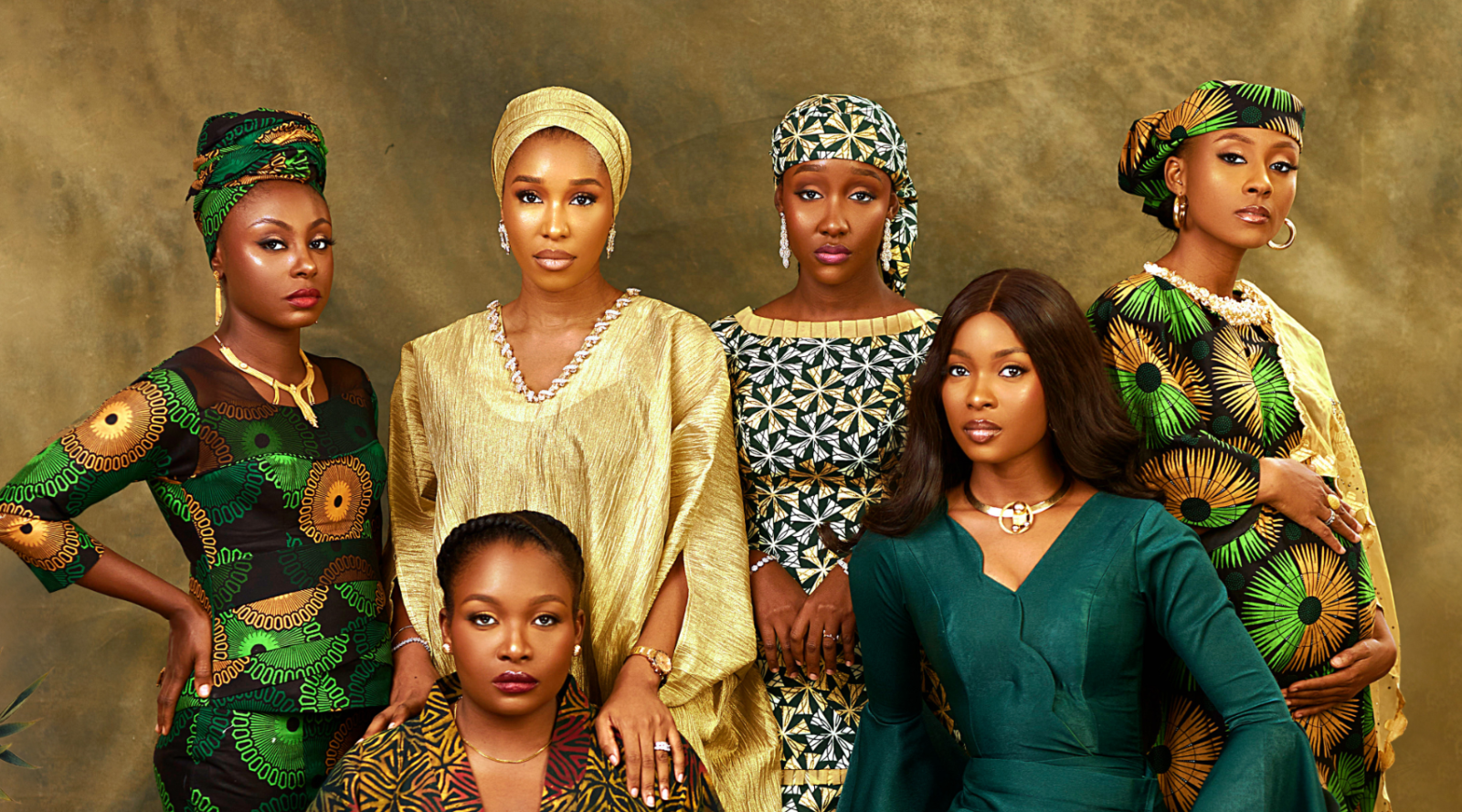However, despite its motivation to present “bold, empowered, and authentic” stories of northern women, the series embraces the tone of a lecture or simply a commentary, as opposed to telling an enjoyable story.
By Seyi Lasisi
When Beyond the Veil (created by Nadine Ibrahim and Sifa Asani Gowon, and produced by Ajifa Atuluku and Folawewo Aiyegbusi) first aired in 2022, Afrocritik’s writer, Vivian Nneka Nwajiaku, wrote about how the series championed the individual stories of five Northern women in a conservative society, its first three lethargic episodes aside. The series had a propensity towards heavy commentary, but it was a welcome portrayal of the hopeful journey of five Nigerian women. Family, love, and friendship took centre stage in the six-part series.
At the end of season one, Na’ima (Jemima Osunde) resolves to follow her heart and shun culture and religion while pursuing her romantic interest, Mathew (Vine Olugu). Hanifa (Maryam Booth), the artist and wife to Ahmadu (Rikadawa Rabiu Mohammed), is still fiercely pursuing her career and education while straddling her marital conflicts along. Surayyah’s (Habiba Tanko Zock-Sock) ambition to capture Kassim (Caleb Richards), Na’ima’s brother’s heart with diabolic potions proves futile, causing her to migrate to Lagos. Badriya “Baddie” (Norah Ego), the social media influencer, may have had her dream wedding but not a dream marriage. And Zainab “Zizi” (Ame Aiyejina), the fiercely self-sufficient security personnel is facing two severe tragedies: Her grandfather’s death and Kassim’s announced intent to marry Maryam (Ijapari Ben-Hirki), a tech enthusiast.
Season two returns with the familiar faces and storyline. Na’ima is on a recovery journey having survived a car crash. Her relationship with Mathew is still with its noticeable conflicts: their religious and cultural differences. Badriya has been defeated into silence by Sadiq (Yakubu Muhammed), her abusive husband. Whilst Zainab is dealing with her fallout with Kassim, Tariq (Andrew Bunting), a private security personnel, is courting her attention. Kassim, in submission to his mother’s wish, is striving to build a relationship with Maryam. Ahmadu and Hanifa’s relationship though the archetypal age-gap marriage has its moments of tenderness. When Hanifa isn’t explaining the cruelty of Ahmadu’s demands for a male child when they have two beautiful daughters, she is diligently studying. Surrayah has heightened her reliance on metaphysical power to attract Kassim. Each of the five ladies is at different points of conflict in their life. And what the script — co-written by Gowon and Brenda Garuba Ogbuka — does is pay adequate attention to each of their distinct stories. None of the five ladies’ stories is bereft of attention and depth. Each has its nuances and development.

According to the show’s creator and director, Beyond the Veil is inspired by the desire to depict northern Nigerian women in a liberating way. Offering a new narrative and pushing for alternative realities for women dominated by patriarchal and religious dogma, the series presented five liberal Northern women pushing against cultural restraints. Reflective of not just northern Nigerian society but the country at large, the series presents, without a judgmental lens, characters who exude patriarchal ethos. Sodiq, for one, conveniently abuses Badriyah. Ahmadu, though the quintessential conservative man who believes in the traditional roles of women, supposedly loves Hanifa. Zainab’s independent disposition is scorned by society. Ahmadu’s character is reminiscent of a conservative man with the innate potential to shed patriarchal dogma when motivated.
However, despite its motivation to present “bold, empowered, and authentic” stories of northern women, the series embraces the tone of a lecture or simply a commentary, as opposed to telling an enjoyable story. When trying to show gender inequality and the importance of the girl child, we receive a lecture. In what should have been a heartfelt conversation between Ahmadu and Hanifa, the moment is drained of emotions and life, and what is achieved is didacticism.
In another scene in episode five, to explain the religious implications of Mathew and Na’ima’s marriage, Beyond the Veil invited Maryam Lemu, a motivational speaker and relationship coach. Not only is this scene cringy to watch due to its deliberate set-up as a sermon, but it’s also tedious to watch Na’ima, a liberal-minded Muslim, gradually succumb to the dictates of religion and culture. While these lecture and sermon-poised dialogues are important in addressing the series’ subject matter, they painfully diminish the cinematic moments that the series has. Sometimes art moves towards didacticism, and more often than not, such art — films, stories, music, and literature — is pretentious due to the creators’ interest in pushing narratives. Keen about clamouring a political or socio-cultural message, the artist loses sight of the ethics of their art form.
For a liberal-minded individual, it’s exhausting seeing Na’ima, who the series has set up as the poster child for liberalism, ease up to conservative dogma. Viewers will recall how Na’ima constantly rejected Amir (David Adoga), a culturally conservative suitor and her strained attempt to abandon her family and begin another with Mathew. One would have expected Na’ima to fully embrace this attempt to be independent of conservative society only to see her relapse into societal conservatism. Understandably, the show is attempting to be respectful of the religion and culture of the conservative society that inspires the story. But, the series does a disservice to Na’ima’s character by making her surrender to the dictates of culture, family, and tradition.

Interestingly, Zainab’s independent spirit shines forth in the concluding part of the series. While one expected her to suppress her happiness and love life with Kassim due to the social difference between them, she decides to fight for her happiness. That is how to create a character with individual strength. What Zainab’s decision implies is how, contrary to how fierce and domineering religion, culture and social divide is, there are situations when as humans we can distance ourselves from societal expectations and embrace inner peace. This resolve of Zainab is what is lacking in Na’ima’s decision.
The acting of the main cast is passable. Aiyejina’s performance as Zainab doesn’t falter in presenting the staunch countenance of the character, and in moments of vulnerability, she is quick to trade the fierce countenance for tenderness. Muhammed’s performance as the abusive Sadiq is admirable. Generally, credited to Ibrahim’s direction, the lead actors’ performances are commendable to watch. However, the same can’t be said about the lethargic performances of the supporting actors. Additionally, Beyond the Veil stuff with brand advertisements. The camera, operated by Femi Sparklite Bamigbola, is quick to capture the brand name of the numerous restaurants and spots the characters visit.
While Beyond the Veil is lukewarm in its progression and acting, the series is a welcome femicentric representation of the lived experiences of northern Nigerian women.
Rating: 2/5
(Beyond The Veil is currently streaming on Prime Video)
Seyi Lasisi is a Nigerian creative with an obsessive interest in Nigerian and African films as an art form. His film criticism aspires to engage the subtle and obvious politics, sentiments, and opinions of the filmmaker to see how they align with reality. He tweets @SeyiVortex. Email: seyi.lasisi@afrocritik.com.



